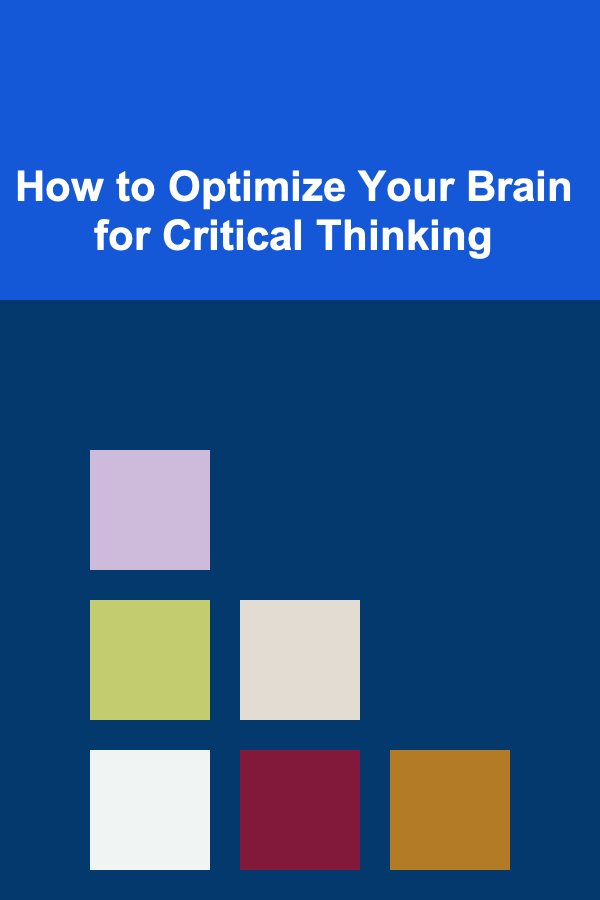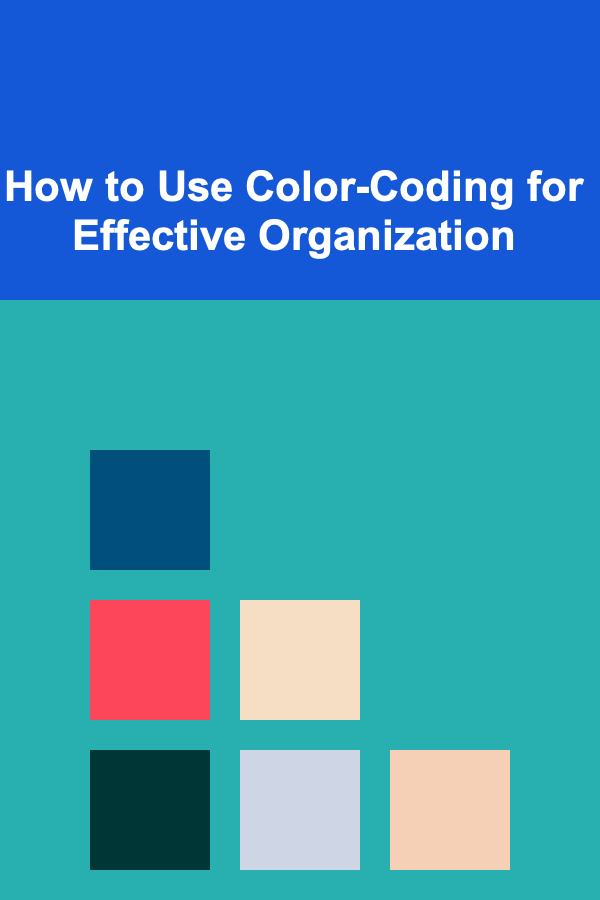
How to Optimize Your Brain for Critical Thinking
ebook include PDF & Audio bundle (Micro Guide)
$12.99$11.99
Limited Time Offer! Order within the next:

Critical thinking is the ability to analyze information objectively and form a reasoned judgment. It involves evaluating evidence, considering different perspectives, and identifying biases to arrive at well-supported conclusions. In a world saturated with information and opinions, critical thinking is more vital than ever. This article delves into practical strategies and cognitive techniques to optimize your brain for critical thinking, empowering you to navigate complex situations with clarity and confidence.
Understanding the Foundations of Critical Thinking
Before diving into optimization techniques, it's crucial to understand the core components that underpin critical thinking:
- Analysis: The ability to break down complex information into smaller, manageable parts to understand its individual components and their relationships.
- Evaluation: Assessing the credibility, relevance, and validity of information sources. This involves scrutinizing evidence for biases, inconsistencies, and logical fallacies.
- Inference: Drawing logical conclusions based on available evidence and reasoning. It's about going beyond the surface level to identify underlying assumptions and potential implications.
- Interpretation: Comprehending the meaning and significance of information. This includes understanding context, identifying patterns, and recognizing nuances in communication.
- Explanation: Communicating your reasoning and conclusions clearly and concisely. This involves articulating your thought process, justifying your claims with evidence, and considering alternative viewpoints.
- Self-Regulation: Reflecting on your own thinking processes and identifying areas for improvement. This includes recognizing your own biases, monitoring your emotional responses, and adjusting your approach as needed.
These elements work synergistically to enable effective critical thinking. By strengthening each component, you can significantly enhance your overall cognitive abilities.
Cultivating a Growth Mindset
Your mindset plays a significant role in your ability to think critically. A growth mindset, as popularized by Carol Dweck, is the belief that intelligence and abilities are not fixed traits but can be developed through dedication and hard work. Adopting a growth mindset is essential for optimizing your brain for critical thinking because:
- It Encourages Learning: A growth mindset motivates you to seek out new knowledge and experiences, which is crucial for expanding your cognitive toolkit.
- It Fosters Resilience: When faced with challenges or setbacks, a growth mindset allows you to see them as opportunities for growth rather than as evidence of your limitations. This resilience is vital for persisting in complex problem-solving.
- It Promotes Openness to Feedback: Individuals with a growth mindset are more receptive to constructive criticism, viewing it as a valuable tool for improvement rather than a personal attack.
How to Cultivate a Growth Mindset:
- Embrace Challenges: Actively seek out tasks that push you beyond your comfort zone.
- Focus on Effort: Recognize that effort and persistence are key drivers of success, not just innate talent.
- Learn from Mistakes: View errors as learning opportunities and analyze what went wrong to improve your future performance.
- Celebrate Progress: Acknowledge and celebrate your accomplishments, no matter how small.
- Replace Limiting Beliefs: Challenge negative self-talk and replace it with positive affirmations that emphasize your potential for growth.
Improving Cognitive Skills
Critical thinking relies on several core cognitive skills that can be developed and honed through targeted practice. Here's how to improve some key abilities:
Enhancing Memory
A strong memory is essential for recalling relevant information and making informed decisions. Techniques to improve memory include:
- Spaced Repetition: Review information at increasing intervals to reinforce learning and improve long-term retention. Tools like Anki can be helpful.
- Mnemonic Devices: Use acronyms, rhymes, or visual imagery to associate new information with existing knowledge.
- Chunking: Break down large amounts of information into smaller, more manageable chunks.
- Active Recall: Test yourself regularly on the material you are trying to learn. This forces your brain to retrieve information, strengthening memory pathways.
Sharpening Attention and Focus
The ability to focus your attention is crucial for avoiding distractions and staying engaged with the task at hand. Strategies to improve attention and focus include:
- Mindfulness Meditation: Practice paying attention to your breath and bodily sensations to train your mind to stay present and focused.
- Time Management Techniques: Use methods like the Pomodoro Technique (working in focused bursts with short breaks) to improve productivity and concentration.
- Eliminating Distractions: Create a dedicated workspace free from interruptions and notifications.
- Regular Breaks: Take short breaks every hour to avoid mental fatigue and maintain focus.
Boosting Reasoning Skills
Reasoning skills are fundamental to critical thinking. They involve the ability to analyze information, identify patterns, and draw logical conclusions. Methods to improve reasoning skills include:
- Logic Puzzles: Solve logic puzzles and brain teasers to challenge your reasoning abilities.
- Debate and Argumentation: Engage in debates and discussions to practice constructing arguments, evaluating evidence, and responding to opposing viewpoints.
- Formal Logic Study: Learn the principles of formal logic to improve your understanding of valid reasoning and identify logical fallacies.
- Case Studies: Analyze case studies in your field of interest to apply your reasoning skills to real-world scenarios.
Developing Specific Critical Thinking Techniques
Beyond improving general cognitive skills, several specific techniques can enhance your critical thinking abilities.
Asking Powerful Questions
Asking the right questions is essential for uncovering assumptions, identifying biases, and gaining a deeper understanding of complex issues. Some useful questioning techniques include:
- The 5 Whys: Repeatedly asking "why" to drill down to the root cause of a problem.
- Socratic Questioning: Using a series of probing questions to stimulate critical thinking and illuminate underlying contradictions.
- Consider Counterarguments: Actively seek out and examine opposing viewpoints to challenge your own assumptions.
- Clarifying Questions: Asking questions to ensure you fully understand the information being presented. Examples: "Could you elaborate on that?" or "What do you mean by X?"
Identifying Biases
Cognitive biases are systematic patterns of deviation from norm or rationality in judgment. Being aware of these biases can help you avoid making flawed decisions. Some common biases include:
- Confirmation Bias: The tendency to seek out information that confirms your existing beliefs and ignore information that contradicts them.
- Anchoring Bias: The tendency to rely too heavily on the first piece of information received (the "anchor") when making decisions.
- Availability Heuristic: The tendency to overestimate the likelihood of events that are easily recalled, even if they are statistically rare.
- Halo Effect: The tendency to allow one positive trait of a person or thing to influence your overall impression of them.
- Dunning-Kruger Effect: The tendency for people with low competence in a task to overestimate their ability.
Mitigating Bias:
- Seek Diverse Perspectives: Consult with people who hold different viewpoints.
- Consider Alternative Explanations: Actively look for reasons why your initial conclusions might be wrong.
- Use Data and Statistics: Rely on objective data to support your decisions, rather than subjective impressions.
- Challenge Assumptions: Question your own beliefs and assumptions regularly.
- Blind Yourself: When possible, make decisions without knowing information that could introduce bias (e.g., reviewing resumes without knowing the candidate's name or gender).
Evaluating Information Sources
In the age of misinformation, it's crucial to be able to critically evaluate the credibility and reliability of information sources. Consider the following factors:
- Source Reputation: Is the source known for accuracy and objectivity? Consider the source's history, mission, and potential biases.
- Author Expertise: Does the author have relevant qualifications and experience?
- Evidence and Citations: Is the information supported by credible evidence and properly cited sources?
- Objectivity and Bias: Does the source present information in a balanced and unbiased manner? Look for signs of bias, such as emotionally charged language or selective presentation of facts.
- Timeliness: Is the information current and up-to-date?
- Fact-Checking: Cross-reference information with other reliable sources to verify its accuracy.
Understanding Logical Fallacies
Logical fallacies are flaws in reasoning that can lead to invalid conclusions. Being able to identify these fallacies is essential for evaluating arguments and avoiding faulty thinking. Some common fallacies include:
- Ad Hominem: Attacking the person making the argument rather than the argument itself.
- Straw Man: Misrepresenting someone's argument to make it easier to attack.
- Appeal to Authority: Claiming that something is true simply because an authority figure said so, without providing other evidence.
- False Dilemma: Presenting only two options when more options are available.
- Bandwagon Fallacy: Claiming that something is true because many people believe it.
- Hasty Generalization: Drawing a conclusion based on insufficient evidence.
- Post Hoc Ergo Propter Hoc (After this, therefore because of this): Assuming that because one event followed another, the first event caused the second.
Learning to recognize these fallacies will significantly improve your ability to analyze arguments critically.
Creating an Environment for Critical Thinking
Your physical and mental environment can significantly impact your ability to think critically. Optimize your environment to support clear thinking and effective decision-making.
- Reduce Stress: Chronic stress can impair cognitive function and hinder critical thinking. Practice stress-reduction techniques such as exercise, meditation, or spending time in nature.
- Get Adequate Sleep: Sleep deprivation can significantly impair cognitive performance. Aim for 7-9 hours of quality sleep per night.
- Maintain a Healthy Diet: Nourish your brain with a balanced diet rich in fruits, vegetables, whole grains, and healthy fats. Omega-3 fatty acids, in particular, are essential for brain health.
- Stay Hydrated: Dehydration can impair cognitive function. Drink plenty of water throughout the day.
- Create a Dedicated Workspace: Establish a quiet and organized workspace free from distractions.
- Surround Yourself with Stimulating Ideas: Read books, listen to podcasts, and engage in conversations that challenge your thinking.
Practical Exercises to Enhance Critical Thinking
Consistent practice is key to developing and maintaining critical thinking skills. Here are some practical exercises you can incorporate into your daily routine:
- Analyze News Articles: Read news articles from different sources and critically evaluate the information presented. Look for biases, logical fallacies, and unsupported claims.
- Solve Real-World Problems: Identify problems in your personal or professional life and apply critical thinking techniques to develop creative solutions.
- Participate in Discussions and Debates: Engage in constructive discussions and debates with others to practice articulating your reasoning and responding to opposing viewpoints.
- Write Argumentative Essays: Write essays that require you to analyze complex issues, present evidence, and construct logical arguments.
- Play Strategy Games: Games like chess, Go, and strategy video games can help you develop strategic thinking and problem-solving skills.
- Keep a Thought Journal: Regularly write down your thoughts, ideas, and observations. Analyze your own thinking processes and identify areas for improvement.
- The Devil's Advocate: Deliberately argue against your own position to uncover potential weaknesses and biases.
Integrating Critical Thinking into Your Daily Life
Critical thinking is not just a skill to be used in specific situations; it's a mindset that can be integrated into all aspects of your life. Here are some ways to cultivate a critical thinking habit:
- Question Everything: Don't accept information at face value. Ask questions, challenge assumptions, and demand evidence.
- Be Open to New Ideas: Be willing to consider different perspectives and change your mind when presented with compelling evidence.
- Practice Active Listening: Pay attention to what others are saying, ask clarifying questions, and try to understand their point of view.
- Reflect on Your Decisions: Regularly reflect on the decisions you make and analyze the reasoning behind them. Identify areas where you could have made better choices.
- Embrace Intellectual Humility: Recognize that you don't have all the answers and be willing to learn from others.
Conclusion
Optimizing your brain for critical thinking is an ongoing process that requires dedication, effort, and a willingness to challenge your own assumptions. By cultivating a growth mindset, improving cognitive skills, developing specific critical thinking techniques, creating a supportive environment, and integrating critical thinking into your daily life, you can significantly enhance your ability to analyze information, solve problems, and make informed decisions. In a world that demands clarity and reasoned judgment, mastering the art of critical thinking is an invaluable asset.

How to Find Second-Hand Storage Solutions for Your Garage
Read More
How to Organize Your Shoes for Quick Access
Read More
How to Set Up a Legal Framework for Renting Out Your Property
Read More
How to Use Color-Coding for Effective Organization
Read More
How to Use Social Media for Promoting Rental Listings
Read More
Using AR for Immersive Training Simulations
Read MoreOther Products

How to Find Second-Hand Storage Solutions for Your Garage
Read More
How to Organize Your Shoes for Quick Access
Read More
How to Set Up a Legal Framework for Renting Out Your Property
Read More
How to Use Color-Coding for Effective Organization
Read More
How to Use Social Media for Promoting Rental Listings
Read More